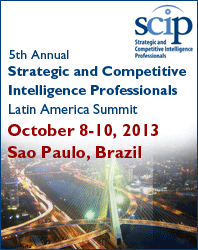 |
||||
|
||||
|
FELLOWS FOCUS Key Organizational Roles in the Protection of Intellectual Property
The SCIP Fellows are a group of CI professionals who have been recognized by their peers for outstanding contributions to the profession and SCIP. Over SCIP’s 28 year history, only 60 individuals have received this high honor. The Fellows Focus column is a new monthly program to share their knowledge and expertise with the broad intelligence community. We kick off the program with the initial column on the issue of intellectual property (IP) protection. Patents, trademarks, and copyrights are forms of trade secrets. These forms of IP are often referred to as proprietary or confidential information. For IP to be protected by the courts, 1) a competitive advantage must result from its secrecy, 2) that advantage must have an economic value, and 3) the owner must make ongoing reasonable efforts to protect the information and keep it secret. A common misappropriation of a trade secret is via a breach of confidentiality, typically between employer and employee. Industrial espionage occurs by unauthorized means, such as eavesdropping, wiretapping, stealing corporate property or cyber theft, the hacking of secret electronic data or information. The protection of a firm’s IP is a responsibility of all employees. However there are several groups who typically play key roles in contributing to a coordinated effort: Legal: Provide legal services to protect firm’s IP, e.g., obtaining patents and copyrights and defending these rights. Act as center of expertise (COE) in interpretation of trade secret laws. Security: Protection of corporate assets, such as physical, document and personnel security. Lead architects of counterintelligence programs and interface with law enforcement authorities. CI: COE for knowledge on competition. Lead programs on collection/analysis/dissemination and protection of human intelligence. Support all other functions in identifying vulnerabilities and defining protection requirements. Marketing: Create and maintain protection of strategic/tactical plans for products and services. Sales: First line direct contact with with external stakeholders, diligently protect proprietary information while ethically serving as intelligence collectors. IT: Create and maintain internal access controls to information systems, and protection from external penetrations of IP via cybercrime. Administrative Assistants: Highly targeted group by external threats. They must be fully compliant with confidential aspect of daily work, vigilant in its protection, and in use of IT systems. R&D: Scientists and engineers develop formulas, designs, drawings and specifications, which are core innovative elements of IP. They must follow rigorous daily guidelines in creation, documentation, access and protection of their work. The protection of a firm’s IP extends beyond the both the physical premises of the workplace and the tenure of an employee at a firm. When employees work remotely, attend conferences or off-site company meetings, the same attention to IP protection is required. Furthermore, the obligation of confidentiality does not end when employees move on to other employers. If exposed to IP while at a prior employer, the confidentiality of that IP must be maintained. Intellectual property protection is a critical element of building and sustaining competitive advantage. Strategy and CI professionals must serve as role models of appropriate behavior. About the Author Cliff Kalb is President and owner of C. Kalb & Associates, a pharmaceutical industry consultancy that specializes in intelligence, analysis, and strategy. He has four decades of experience in the pharmaceutical industry, both as a consumer and producer of intelligence. Cliff was formerly Senior Vice President with Wood Mackenzie’s Life Sciences Consultancy, and served as the Head of Strategic Business Analysis at Merck & Co, Inc., their global intelligence function. He previously held positions of increasing responsibility in sales, market research, health economics, public policy, marketing, licensing and business development at Pfizer and Roche. He has been actively engaged in both studies and execution of business arrangements including licensing, joint marketing, joint ventures, mergers and acquisitions in the industry for the past 25 years. |









